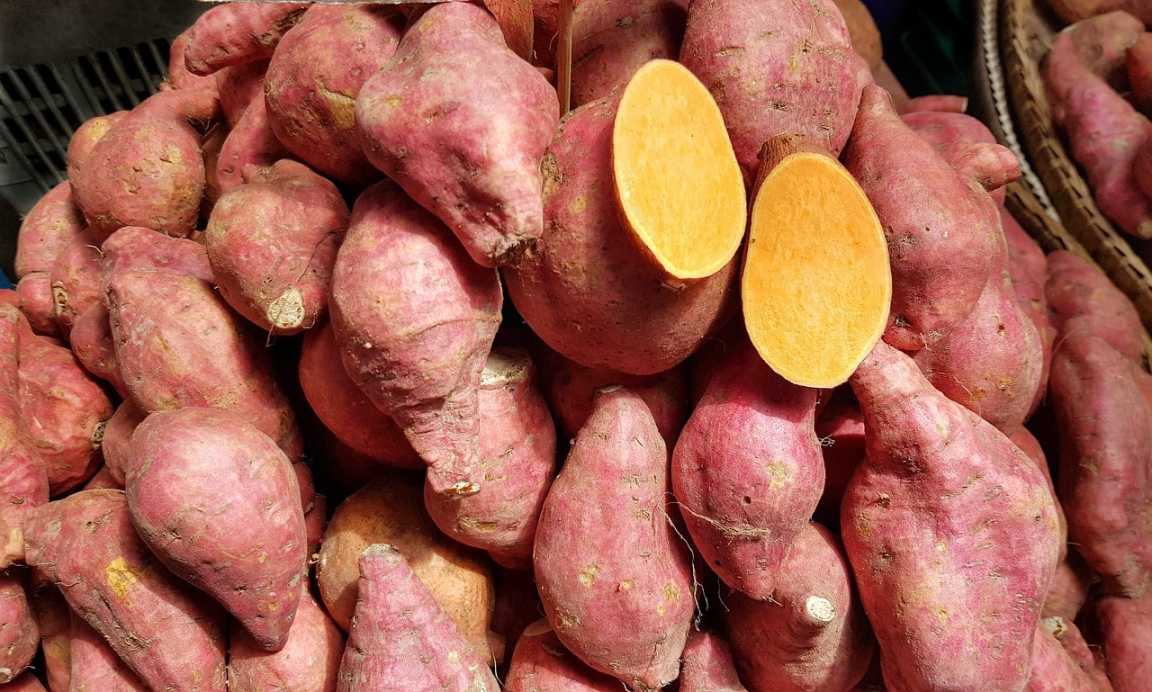Are Sweet Potatoes Good For Rabbits?
Rabbits are herbivores and their diet primarily consists of hay, fresh vegetables, and a limited amount of fruits. As a pet owner, it is important to ensure that your rabbit’s diet is well-balanced and provides all the necessary nutrients for their overall health and well-being. Sweet potatoes are a popular food among humans, but can rabbits eat sweet potatoes? Let’s find out.

Nutritional Value of Sweet Potatoes
Sweet potatoes are a root vegetable that is rich in vitamins and minerals. They are an excellent source of Vitamin A, Vitamin C, and dietary fiber. Sweet potatoes also contain small amounts of calcium, iron, and potassium. These nutritional properties make sweet potatoes a healthy food choice for humans, but what about rabbits?
Can Rabbits Eat Sweet Potatoes?
The short answer is yes, rabbits can eat sweet potatoes, but in moderation. While sweet potatoes can provide some nutritional benefits to rabbits, they should not be a staple food in their diet. It is crucial to remember that rabbits have specific dietary requirements, and their main diet should consist of hay and fresh vegetables.
The Benefits of Sweet Potatoes for Rabbits
Although sweet potatoes should not be a primary food source for rabbits, they can be a healthy occasional treat. Here are some potential benefits of feeding sweet potatoes to rabbits:
- Source of Vitamin A: Sweet potatoes are rich in Vitamin A, which is essential for maintaining good vision, promoting healthy skin, and supporting the immune system.
- Dietary Fiber: Sweet potatoes contain dietary fiber, which aids in proper digestion and can help prevent gastrointestinal problems in rabbits.
- Antioxidants: Sweet potatoes are antioxidant-rich, which can help support the overall health and well-being of rabbits.
How to Feed Sweet Potatoes to Rabbits
When feeding sweet potatoes to rabbits, it is important to follow these guidelines:
- Small Portions: Sweet potatoes should only be given to rabbits in small portions as an occasional treat.
- Cooked or Raw: Sweet potatoes can be fed to rabbits either cooked or raw. However, it is essential to avoid seasoning or adding any oils or spices.
- Cut into Small Pieces: Sweet potatoes should be cut into small, bite-sized pieces to prevent choking hazards.
- Observe for Digestive Issues: After feeding sweet potatoes to your rabbit, monitor their digestion. If you notice any digestive issues such as diarrhea or bloating, discontinue feeding sweet potatoes immediately.
Note: Always consult with a veterinarian before introducing any new foods to your rabbit’s diet. They can provide specific recommendations based on your rabbit’s individual needs and overall health.
FAQs about Sweet Potatoes for Rabbits
1. Can rabbits eat sweet potato leaves?
Yes, rabbits can eat sweet potato leaves. They are safe and can be a valuable addition to their diet. However, make sure the leaves are thoroughly washed to remove any pesticides or dirt.
2. Can rabbits eat sweet potato skins?
No, rabbits should not eat sweet potato skins. The skin can be difficult for rabbits to digest and may cause digestive issues. It is best to remove the skin before feeding sweet potatoes to rabbits.
3. Can sweet potatoes replace hay in a rabbit’s diet?
No, sweet potatoes should not replace hay in a rabbit’s diet. Hay is an essential part of a rabbit’s diet as it helps maintain proper dental health and provides necessary fiber. Sweet potatoes should only be given as an occasional treat.
4. Are there any risks associated with feeding sweet potatoes to rabbits?
Feeding sweet potatoes to rabbits in moderation is generally safe. However, overfeeding or introducing sweet potatoes abruptly can cause digestive upset. Always monitor your rabbit’s reaction to new foods and consult a veterinarian if you have any concerns.
In conclusion, sweet potatoes can be a healthy occasional treat for rabbits due to their nutritional value. However, they should not replace the main components of a rabbit’s diet, such as hay and fresh vegetables. Always introduce new foods gradually and consult a veterinarian to ensure your rabbit’s diet is well-balanced and appropriate for their individual needs.
Related Articles…
Copyright Notice:
The images displayed here are sourced from the internet, with copyrights held by respective owners. For removal of any copyrighted image, please email us.